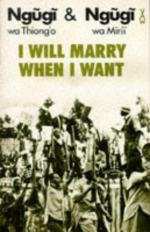|
This section contains 740 words (approx. 2 pages at 400 words per page) |

|
Point of View
The play is told from a third-person omniscient point of view, focusing on the experience of Kiguunda. He is the primary character through which we observe the events of the play unfold.
Language and Meaning
The play is written in verse, and the language tends to be accessible and informal. The text oscillates fluidly between dialogue and song, adding a musical quality to the entirety of the play. The authors also sometimes incorporate Kenyan words to create an impression of authenticity, such as when Kiguunda recalls how he used to “sing and dance the Mucung’wa dance” (10). These Kenyan words often accompany fond memories of the character’s pre-independence days, incorporating elements of Kenyan culture throughout the play. The songs that periodically split up the dialogue are also easy to follow and contain simple refrains, enabling the audience to participate and empathize with the characters...
|
This section contains 740 words (approx. 2 pages at 400 words per page) |

|




